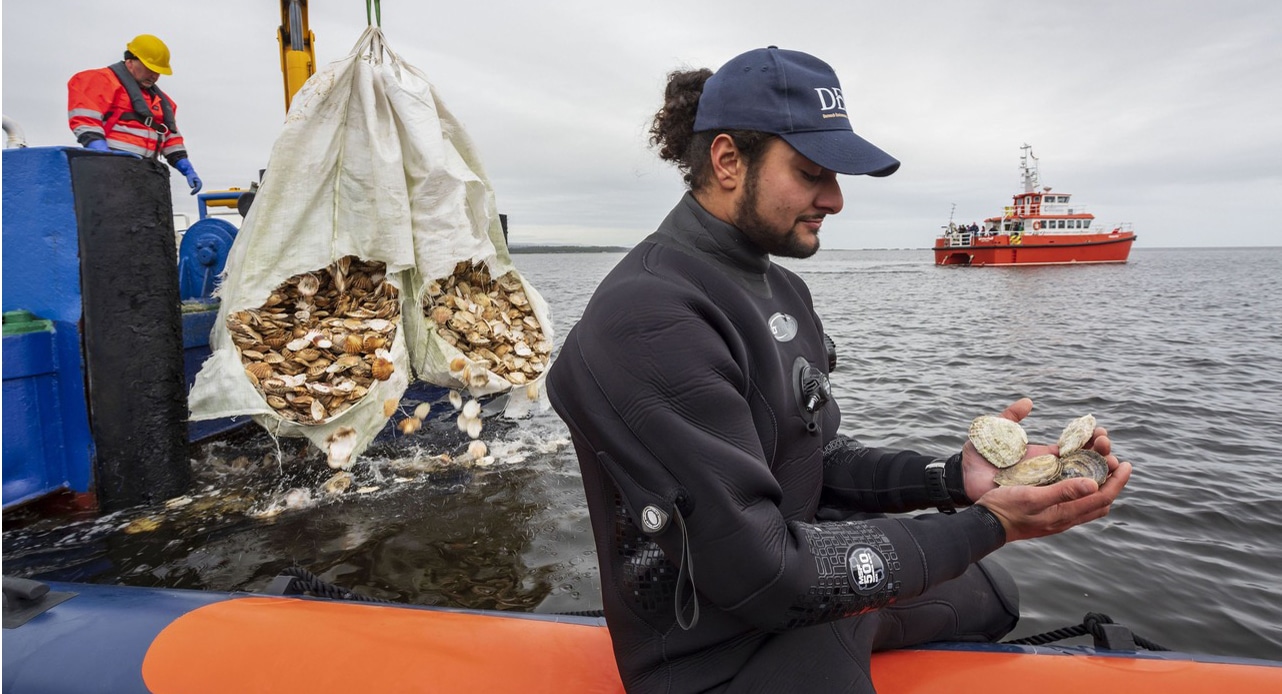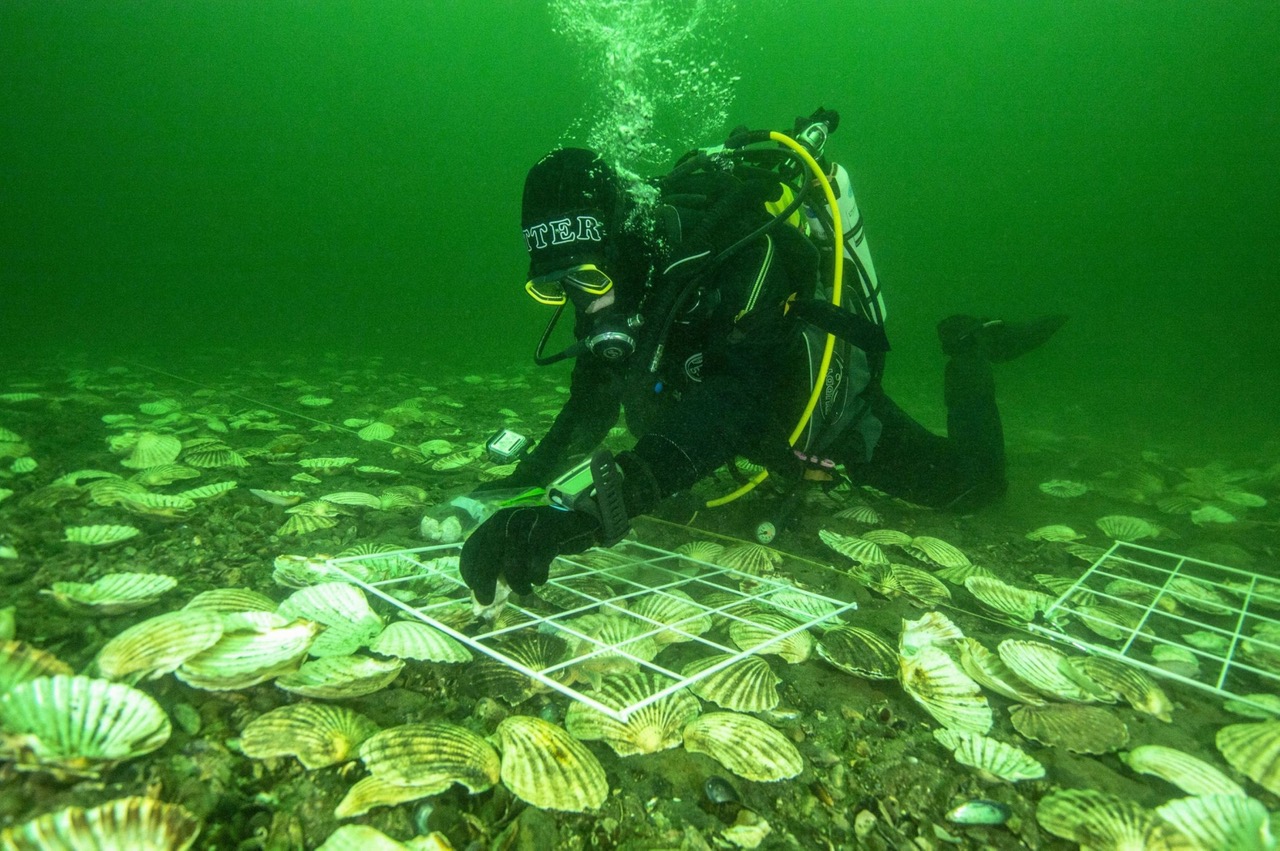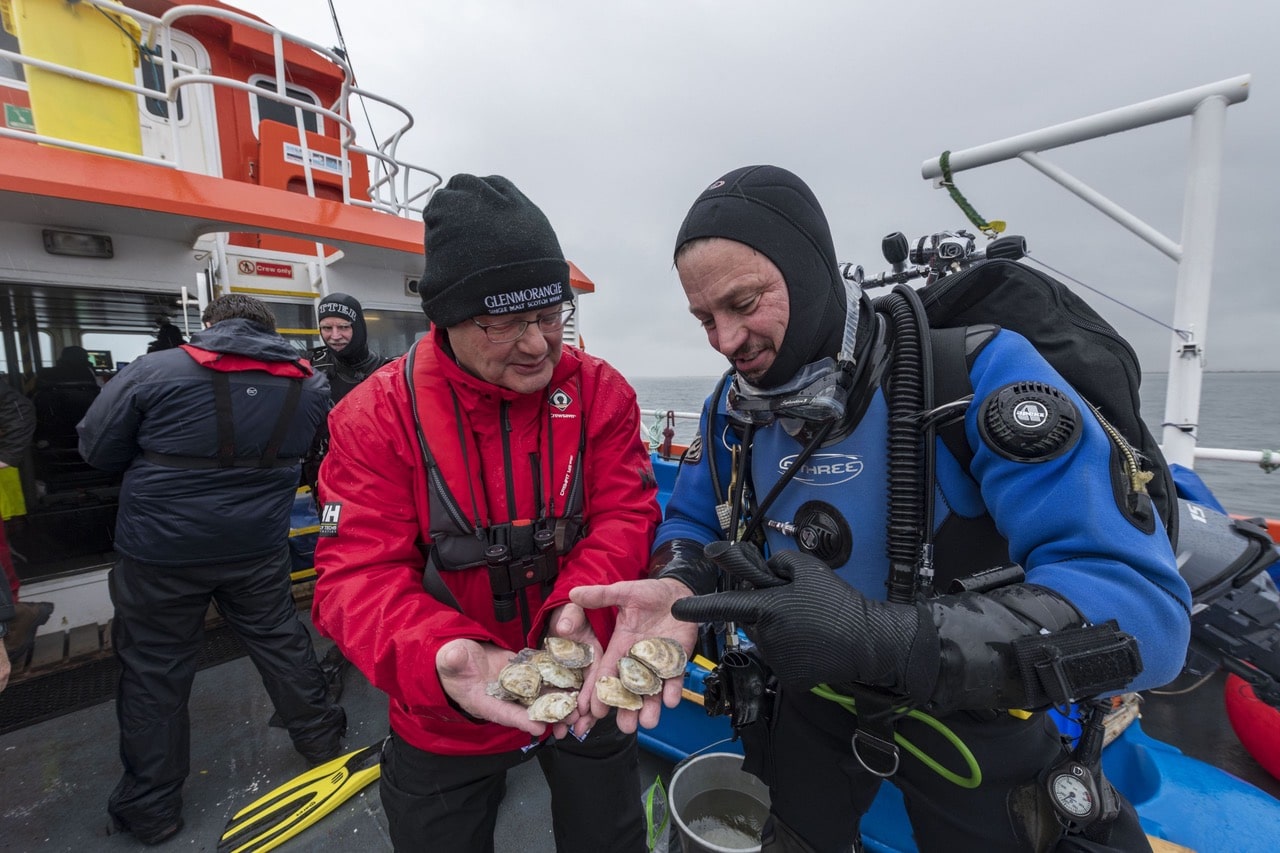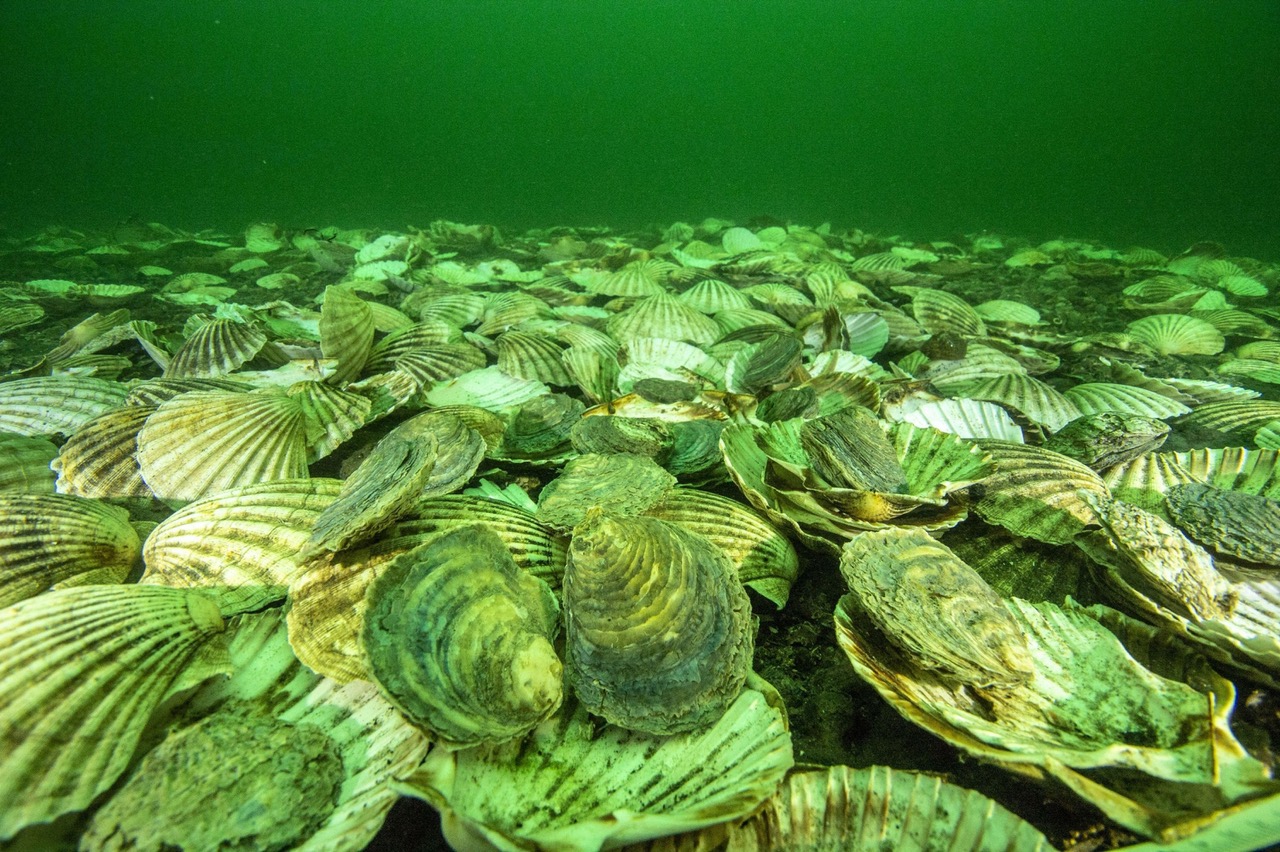News
Glenmorangie Distillery recreates extinct native oyster reefs in Scotland in an environmental first

 Glenmorangie returns 20,000 oysters to the sea near its home
Glenmorangie returns 20,000 oysters to the sea near its home
A total of 20,000 oysters are to be introduced into the sea near Glenmorangie’s Highland home, as part of the Single Malt whisky’s ground-breaking project to restore oyster reefs fished to extinction a century ago. In pursuit of its vision to enhance the marine biodiversity of the Dornoch Firth, Glenmorangie and its partners last year placed 300 oysters in its protected waters, to confirm the species could survive. Now, for the second phase of the project, they are to recreate entire reefs – the very first time this has been attempted anywhere in Europe.
Glenmorangie is dedicated to protecting and improving the beautiful surroundings which have been its home for 175 years. With this commitment in mind, it forged the Dornoch Environmental Enhancement Project (DEEP), with Heriot-Watt University and the Marine Conservation Society in 2014, to bring oysters back to the Firth. Established reefs in the Firth will increase biodiversity and act in tandem with Glenmorangie’s anaerobic digestion plant, to purify the surrounding seas of their distillation.
Researchers introduced the first 300 native European oysters in 2017. These oysters thrived, paving the way for a feat never before attempted in Europe – recreating natural reefs. From this month, 20,000 oysters will be carefully placed on the first of these reefs, specially created from waste shell, to mimic their natural habitat. The native oysters, all grown in the UK, painstakingly cleaned and checked for disease and unwanted hitchhikers, will be regularly monitored.
Based on a successful outcome of this 20,000 oyster trial numbers will be increased to 200,000 over three years. Over five years, the population will be built up to four million, spread over 40 hectares restoring the self-sustaining oyster reefs that existed in the Firth, until they were fished out in the 1800s. An Independent Research Advisory Panel (IRAP) of leading European Marine scientists has also been created. Led by Professor John Baxter the panel will have oversight of the DEEP project.
Hamish Torrie, Glenmorangie’s CSR Director, said: ‘We are very excited to move DEEP to its next stage and have been hugely encouraged by the enthusiastic support that our meticulous, research-led approach has received from a wide range of Scottish Government agencies and native oyster growers – it is a truly collaborative effort. We are all very proud that in our 175th year the Distillery has such a pioneering environmental project right on its doorstep.’
Dr Bill Sanderson, Associate Professor of Marine Biodiversity at Heriot-Watt, said: “This is the first time anyone has tried to recreate a natural European oyster habitat in a protected area. Working closely with Glenmorangie, we hope to create an outstanding environment for marine life in the Firth – and act as a driving force behind other oyster regeneration work across Europe.”
Thomas Moradpour, President and CEO of The Glenmorangie Company, said: “DEEP is a vital part of our vision for a fully sustainable business. Supported by Moët Hennessy Louis Vuitton and our partners, we’ll do all we can to champion this innovative project, soon to be showcased at our Open Weekend at The Glenmorangie Distillery.’
For more information about the Marine Conservation Society visit their website by clicking here.
For more information about Glenmorangie visit their website by clicking here.
Gear News
Introducing the TR-80, IR-50 and CS-30 Regulators from DYNAMICNORD

Whether you are a beginner or a professional diver – with the three new main regulators from DYNAMICNORD, everyone will find their favourite regulator. They all look super stylish.
Excellent performance with the TR-80
Quality and performance are the be-all and end-all for regulators. It is not for nothing that the TR stands for Tec Reg. The innovative design of the TR-80 guarantees absolute reliability – even in ice-cold waters.

Perfect breathing effort at 0.8 J/l / certified for diving in waters below 10 degrees / structural design made of solid brass for best cold protection / membrane-compensated design with dry seal of the first stage / reduced exhalation effort thanks to optimized exhalation membrane and bubble deflector / adjustable Venturi (dive/predive) and adjustment knob for individual inhalation comfort / innovative design of the front cover prevents free-flow in strong currents or when diving with scooters / design made of sandblasted brass, matt chrome finish / 2 HP and 4 LP outlets / mouthpiece made of high-quality, anti-allergic silicone for maximum comfort.


Amazing underwater adventures with the IR-50
The IR-50 is the top regulator for advanced and experienced divers. Natural breathing is the essence of this regulator.

Ideal breathing effort at 0.8 J/l /certified for diving in waters below 10 degrees / compensated membrane / adjustable venturi (dive/predive) and adjustment knob for individual inhalation comfort/ outlet valve and deflector for minimum exhalation effort and reduction of bubbles on the face / design made of sandblasted brass, matt chrome finish / 2 HP and 4 NP outlets / mouthpiece made of high-quality, anti-allergic silicone for maximum comfort.


The Workhorse – our CS-30
For diving centres and diving beginners – the workhorse stands for strong construction, reliability and robustness. Perfect for your training.

Optimal breathing effort at 0.8 J/l /recommended for diving in waters above 10 degrees / non-compensated piston / adjustable venturi (dive/predive) / outlet valve and deflector for minimum exhalation effort and reduction of bubbles on the face / design made of sandblasted brass, matt chrome finish / 1 HP and 3 NP outlets / mouthpiece made of high-quality, anti-allergic silicone for maximum comfort.


Octopus OP-30
The OP-30 is the ideal addition to all DYNAMICNORD regulators. It is identical in construction to the CS-30.

The TR-80, IR-50, CS-30 (DIN & INT) regulators and the Octopus OP-30 are available from DYNAMICNORD dealers and in the online store.
DYNAMICNORD – Your Outdoor Companion.
Marine Life & Conservation
Paul Watson Released as Denmark Blocks Japan’s Extradition Bid

Renowned anti-whaling activist Paul Watson has been released from custody in Greenland after spending five months in detention. Denmark’s Justice Ministry rejected Japan’s request for his extradition, citing insufficient guarantees that his time already served in custody would be credited against any potential sentence.
The 74-year-old Canadian-American was arrested on July 21 in Nuuk, Greenland’s capital, when his ship docked to refuel. His arrest was based on a 2012 Japanese warrant related to a 2010 encounter in Antarctic waters. Japan alleged Watson obstructed operations and caused damage to a whaling research ship during efforts to disrupt illegal whaling. Watson has consistently denied these claims, maintaining his commitment to marine conservation.
Denmark, which oversees extradition matters for Greenland, concluded that while the legal conditions for extradition were met, the lack of assurances from Japan regarding time-served credit made extradition untenable.
In a video shared by his foundation, Watson expressed gratitude and relief, saying, “After five months, it’s good to be out… and good to know they’re not sending me to Japan.” He added that the most difficult part of his time in custody was being separated from his two young sons.
Watson is a pioneering figure in marine conservation, known for founding the Captain Paul Watson Foundation in 2022 after decades of activism with the Sea Shepherd Conservation Society. His bold efforts to defend marine life have earned him widespread support, including from celebrities and conservationists. His work has also been featured in the acclaimed reality TV series Whale Wars.
Watson’s lawyer, Jonas Christoffersen, praised the decision, stating, “We are happy and relieved that Paul Watson is now free.” He added that Watson is eager to reunite with his family and continue his vital work.
The arrest occurred while Watson’s vessel, the M/Y John Paul DeJoria, was en route to the North Pacific with a team of 26 volunteers to intercept a Japanese whaling ship. His foundation described the arrest as politically motivated and emphasized that Watson’s actions were focused on ending illegal whaling practices.
Japan resumed commercial whaling in 2019 after leaving the International Whaling Commission, asserting that whale meat is a cultural tradition. Conservationists, however, continue to challenge these practices, highlighting their impact on marine ecosystems.
Despite the challenges, Watson remains steadfast in his mission to protect marine life and bring attention to whaling practices. His dedication to ocean conservation has made him a globally respected advocate for the environment.
-

 News2 months ago
News2 months agoIconic SS United States to become the World’s Largest Artificial Reef
-

 News3 months ago
News3 months agoBook Review – 52 Assignments: Underwater Photography
-

 Gear News3 months ago
Gear News3 months agoDYNAMICNORD – New German diving brand enters the British market
-

 News3 months ago
News3 months agoExploring Cenote El Pit: A Diver’s Dream
-

 Gear News3 months ago
Gear News3 months agoTry BARE drysuits (and maybe even win one!) this Friday with Sea & Sea at North West Dive Fest
-

 Marine Life & Conservation3 months ago
Marine Life & Conservation3 months agoBook Review: Coral Triangle Cameos
-

 Blogs2 months ago
Blogs2 months agoDive the Egyptian Red Sea this Autumn with Regaldive
-

 News3 months ago
News3 months ago2024 Ocean Art Underwater Photo Competition Announced



















